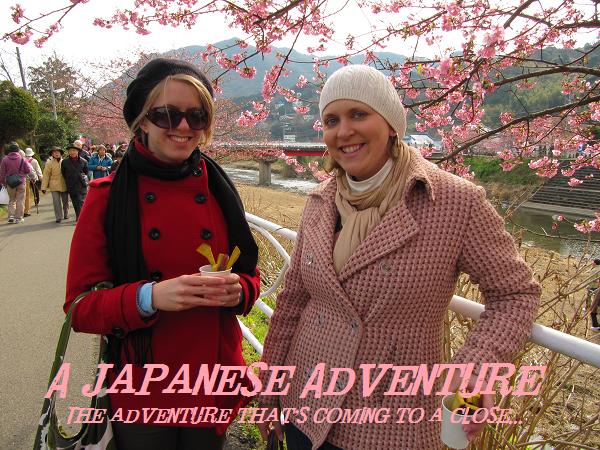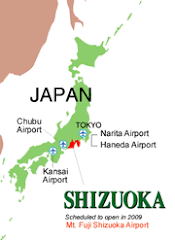 A few people have asked me about religion in Japan. Recently a Fuji area ALT wrote an article for The Shizuoka Chronicle, our yearly newspaper that goes to all the new ALTs coming this summer as well as all the area schools. I thought she did an amazing job and asked her if I could post the full article as a guest post on my blog. So, without further ado, here's Shivonne DuBarry on religion in Japan:
A few people have asked me about religion in Japan. Recently a Fuji area ALT wrote an article for The Shizuoka Chronicle, our yearly newspaper that goes to all the new ALTs coming this summer as well as all the area schools. I thought she did an amazing job and asked her if I could post the full article as a guest post on my blog. So, without further ado, here's Shivonne DuBarry on religion in Japan:“I don’t believe in God personally. I don’t know many people who do.” This is how Mizuka, a teacher from Shizuoka, explains her convictions. Yet she visits Shinto shrines to pray for good fortune and, when she dies, her bones will be buried at the Buddhist temple of her husband’s family. Those of us from societies with monotheistic Abrahamic traditions may find it unproductive to approach Japanese spirituality using familiar notions of religion. Here in Japan, no prominence is given to the question of god, nor is there a preoccupation with ideological self identification.
“I think the biggest difference between the religions in Japan and the West is the existence of the God (the Almighty).” Rev. Takafumi Kawakami is Vice Abbot and Director of International Affairs at Shunkoin Temple in Kyoto’s famous Myoshin-ji complex. “In the West, the God is perfect and always right. But, in Japan, there is no perfect being. Thus, the religion in the West (Judeo-Christianity) has the clear definitions of "good " and "bad". But, in Japan, everything is relative.”
Most modern Japanese are Shinto (83.9%) or Buddhist (71.4%) according to the CIA World Factbook. These numbers show that most Japanese are actually Shinto and Buddhist. So, for example, a person might visit a Buddhist temple during the Obon festival to pray for his ancestors. But on New Year’s Day he might perform Hatsumode, or the first visit to a Shinto shrine to pray for luck in the coming year. Miyamairi is when a newborn is taken to a shrine to get blessings. Funerals, on the other hand, typically take place at temples.
And this syncretism has extended in recent years. Along with Halloween and Valentine’s Day, many Japanese now celebrate Christmas in some way, even if only with the mandatory strawberry shortcake.
More and more also choose to have Christian style weddings – walking down the aisle, exchanging of rings and even Christian vows. High school student Marie says she thinks “White Weddings” are even more popular than traditional Shinto ceremonies at the moment. She would like to have one herself someday. Why the popularity of such an importation in a country with its own rich cultural endowment?
“Cuz it’s pretty,” says Mizuki with a smile. “Many Japanese…accept what they think is good from different religions.” This kind of theological shopping around, alien though it may be to outsiders, takes place in many societies as a result of contact between cultures.
Some observers believe that the fluidity of the average Japanese person when it comes to religion is rooted in the nation’s Shinto foundation. The acceptance of myriad deities (or kamis), it is thought, made it easy for Japan to accept the philosophies of the outside world. Thus, Buddhism came to Japan in the 6th century via Korea and was made the official state religion by the 8th century. Jesuit missionaries brought Christianity in the 16th century and today, about 1% of the population is Christian. Confucianism and Taoism from China have also had some influence.
Even though it’s still somewhat taboo to talk about religious beliefs among friends and colleagues, Japan is pretty relaxed about the whole thing. Extremism does not thrive here. Reverend Kawakami says that’s, “Because most Japanese are not religious at all. But, in the past, we had a lot of religious conflicts.” There are some notable exceptions though, like the 1995 Tokyo subway gas attack carried out by members of Aum Shinrikyo, a new religious movement.
There’s also the interesting case of Pana-Wave Laboratory, a new religious movement that made headlines when they attempted to kidnap a beloved Artic seal called Tama-chan, in order to stop doomsday from happening.
It seems that the ideas behind religious practices aren’t particularly important to most, though. Kawakami says, “People just focus on the formality. They just attend the rituals. But, they do not know what those ritual means. I can say that the religion has become less important than the past. But, people are still very superstitious.” Indeed, amulets or omamori, are big sellers. They are supposed to bring anything from a safe pregnancy to safe driving. Teenagers like Ena go to shrines to pray for help at the university entrance examination.
Mizuki sums it up: “If you ask a Japanese person what god is, I don’t think they would know. We do (rituals) because of tradition. And because we think if we don’t, something bad will happen.”
*Shunkoin Temple offers zazen meditation classes in English as well as tours and accommodations in Kyoto.
--
Shivonne also writes a blog about cool places around Fuji City, which might be interesting to those living in Japan.


No comments:
Post a Comment